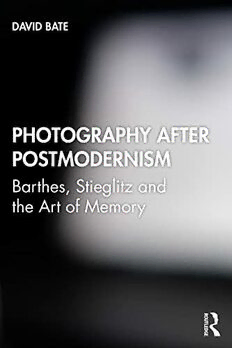Table Of ContentPHOTOGRAPHY AFTER
POSTMODERNISM
In life after postmodernism our conception of photography is not the same as before.
Photography after Postmodernism starts with this conception and explores what changes
have afected photography, its relation to social life and our image-centred culture.
Engaging with the visual environment and issues that have emerged in
the postmodern world, David Bate introduces fresh approaches and analysis of
photographs and their place within the aftermath of postmodernist thought.
The book shows how photographs circulate in an ‘image-world’ beyond their art
or media origins that deeply afects our sense of time and relation to memory.
The role of archives, dreams, memories and time are deployed to develop and
resituate arguments about photography made by Roland Barthes in Camera Lucida
to further engage and understand our contemporary condition. By considering
how ‘afterwardness’ is invoked in the developments of modern and contemporary
photography, Bate demonstrates the complex ways in which photographic images
resonate across public and private spaces, while carrying a slippage of meaning that
is never quite fxed, yet always contingent and social. The approach shows how
modernist photography was already invested in values that its discourse could not
enunciate, which resonates with much contemporary photography today.
Featuring a range of historical and contemporary images, the book ofers
detailed and innovative readings of specifc photographs which open new avenues
of thought for those studying and researching visual culture and photography.
David Bate is Professor of Photography at the University of Westminster,
London, UK. His many writings on photography, theory, art and culture are
extensively published. His frst book was the highly acclaimed Photography and
Surrealism: Sexuality, Colonialism and Social Dissent (2004); and the widely translated
Photography: Key Concepts (2019) continues to be an essential introductory book for
photography students. Also a practising artist, his photographic projects have been
shown in Australia, China, Europe, South Korea, North America and the UK.
PHOTOGRAPHY AFTER
POSTMODERNISM
Barthes, Stieglitz and the
Art of Memory
David Bate
Cover image: © David Bate, Screen Memory, 2020.
First published 2023
by Routledge
4 Park Square, Milton Park, Abingdon, Oxon OX14 4RN
and by Routledge
605 Third Avenue, New York, NY 10158
Routledge is an imprint of the Taylor & Francis Group, an informa business
© 2023 David Bate
The right of David Bate to be identifed as author of this work has been
asserted in accordance with sections 77 and 78 of the Copyright, Designs
and Patents Act 1988.
All rights reserved. No part of this book may be reprinted or reproduced or
utilised in any form or by any electronic, mechanical, or other means, now
known or hereafter invented, including photocopying and recording, or in
any information storage or retrieval system, without permission in writing
from the publishers.
Trademark notice: Product or corporate names may be trademarks or
registered trademarks, and are used only for identifcation and explanation
without intent to infringe.
British Library Cataloguing-in-Publication Data
A catalogue record for this book is available from the British Library
Library of Congress Cataloging-in-Publication Data
Names: Bate, David, 1956– author.
Title: Photography after postmodernism : Barthes, Stieglitz and
the art of memory / David Bate.
Description: Abingdon, Oxon ; New York, NY : Routledge, 2022. |
Includes bibliographical references and index.
Identifers: LCCN 2021059989 (print) | LCCN 2021059990 (ebook) |
ISBN 9781845115012 (hardback) | ISBN 9781845115029 (paperback) |
ISBN 9781003086284 (ebook)
Subjects: LCSH: Barthes, Roland. | Stieglitz, Alfred, 1864-1946. |
Photography—Philosophy. | Postmodernism. |Photography—Social aspects. |
Photography—History—20th century.
Classifcation: LCC TR183 .B375 2022 (print) | LCC TR183 (ebook) |
DDC 770.1—dc23/eng/20220217
LC record available at https://lccn.loc.gov/2021059989
LC ebook record available at https://lccn.loc.gov/2021059990
ISBN: 978-1-845-11501-2 (hbk)
ISBN: 978-1-845-11502-9 (pbk)
ISBN: 978-1-003-08628-4 (ebk)
DOI: 10.4324/9781003086284
Typeset in Bembo
by Apex CoVantage, LLC
FIGURE 0.0 David Bate, Screen Memory, 2020.
CONTENTS
Acknowledgements viii
Introduction 1
1 After Postmodernism? 11
2 Roland Barthes and Camera Lucida 31
3 Return of the Tableau 53
4 The Lactation of Meaning: Jef Wall 75
5 Alfred Stieglitz and the Migration of Meaning 101
6 The Archival Dream 127
7 The Photographic Episteme 151
Bibliography 168
Picture Credits 180
Index 182
ACKNOWLEDGEMENTS
This book has been a long time in the making and would not exist at all without
the patience, perseverance and, above all, the positivity of Philippa Brewster, who
originally commissioned the book. I would thank her for all her work towards it,
and Jennifer Vennall and Natalie Foster for its completion at Routledge.
Some chapters in the book owe a debt to earlier iterations and outings as lec-
tures, short essays or conference interventions in the UK, across Europe, the USA
and Australia. I would like to thank all those audiences, students, institutions and
scholars, photographers and artists, and other people who had the curiosity to hear
and were generous enough to ask questions, engage or add comments. There are
also numerous friends, artists, students, intellectual companions, colleagues and
student researchers who helped in one way or another, knowingly or not, with
the work and process of publication of this book. I apologize for the bland listing
of names: Parveen Adams, Karin Bareman, Victor Burgin, David Campany, Mark
Cousins, Andrew Dewdney, David Evans, Andy Golding, Gavin Jack, Vebhi Koca,
Susan Lawson, Andreia Alves de Oliveira, Francette Pacteau, Daniel Palmer, Anna
Pawlowska, Eileen Perrier, Liina Siib, Mitra Tabrizian, Rosie Thomas and Richard
West. The responsibility for what is said in what follows is of course, however,
entirely my own.

